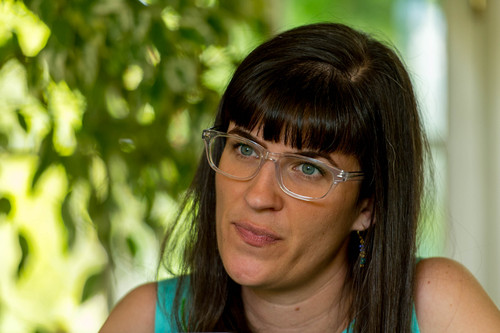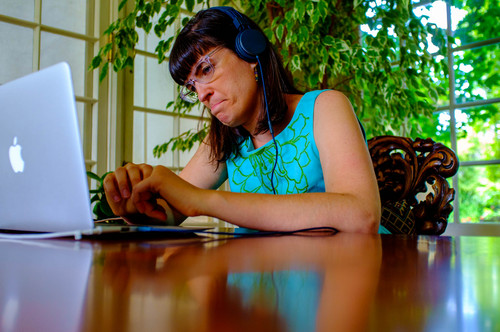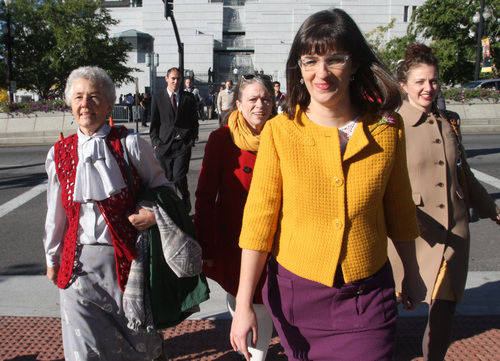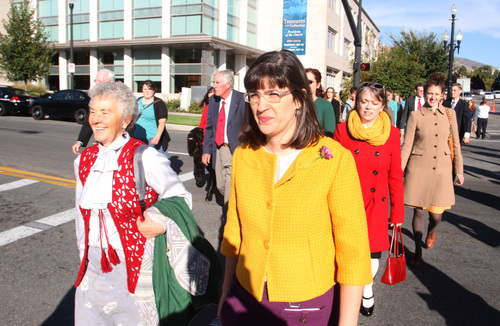This is an archived article that was published on sltrib.com in 2014, and information in the article may be outdated. It is provided only for personal research purposes and may not be reprinted.
They are anxious, worried and occasionally petrified.
They have been lectured and patronized and shunned by fellow Mormons who were once friends — and even blocked from family gatherings.
In a barrage of brutal online insults, they have been called "mean-spirited," "misguided twits," "heretics to be burned at the stake," "arrogant," "self-centered" and "anti-Christs," who believe that "all men are pigs."
So who are these so-called demons?
They are churchgoing, believing Mormons who boldly posted their photos and signed their names in support of Ordain Women, a movement that pushes for female ordination to the all-male LDS priesthood. These members see no incompatibility between Mormonism and their dedication to gender equality in the faith they love.
Now, such a balancing act has become tougher for many to maintain — and it might depend on where they live.
On June 23, LDS lay leaders in Virginia excommunicated Ordain Women founder Kate Kelly for "conduct contrary to the laws and order of the church."
Kelly says her parents, who live in Provo, had their "temple recommends" (which give members access to Mormon temples) withdrawn for supporting their daughter.
When asked if all those who have posted profiles on Ordain Women's website were in danger of losing their temple privileges, LDS Church spokesman Cody Craynor said last month, "Qualifying for a temple recommend is a matter between members and local leaders."
Latter-day Saints revere temples as houses of God, holy sanctuaries where they learn about mankind's potential and relationship with deity, while taking part in their religion's highest sacraments, including eternal marriage.
Since the headline-grabbing action against Kelly, five of the 350 people originally profiled on OW's website have asked to have their materials deleted, while an additional 175 or so have submitted new profiles. Of the total, organizers say, more than 70 percent attend LDS services at least twice a month — if not more. Only a handful have faced any kind of formal church sanction for their participation, but many more wonder if it's coming.
Suzette Smith, who lives in the Washington, D.C., area, says she has "wise, thoughtful ward and stake [regional] leaders — both men and women," with whom she has discussed her Ordain Women ties.
"I draw strength from serving in the ward and from worshipping with others in faith. I also have a temple recommend and love attending. It is another place where I draw strength and gain insight," Smith writes in an email. "I feel embraced by my ward members and well supported, but I know not everyone agrees. I'm OK with that. We all bring different gifts and ideas to the body of Christ. I do feel that I am watched for my reaction to feminist and priesthood ideas because of my OW affiliation. That can be hard, but I don't blame others for it. It comes with the territory."
Smith's main worry is that she will be forced to choose between her recommend and her resolve with the ordination movement.
"I feel strongly about both areas of my life," she says. "I have considered my involvement with OW very seriously, as I think most people do. I have prayed over it, pondered about it, and talked to many faithful friends and leaders about it. I feel strongly about women being ordained and feel guided to be involved in the conversations in and outside OW."
Misperceptions about the movement have surfaced on both sides, Smith says. "I continue to work with the genuine and caring supporters of OW in hopes to repair those misconceptions and move forward together as a church. I seek continual dialogue with my church leaders of all levels and with my fellow saints."
Amy Cartwright, of Calgary, Alberta, feels safer outside the Intermountain West, specifically Utah.
The week after Kelly got a notice of impending disciplinary action, Cartwright got a call from her LDS bishop, asking her to meet with him. She nervously awaited the day, wondering if her Ordain Women involvement — which her Mormon leaders knew about — would cause her ecclesiastical trouble.
No, she says with bemused relief, the bishop extended a "calling" (church assignment) to her.
"He felt I was in a different position than Kate," Cartwright says. "I found it heartening but also disheartening, because I don't see a huge degree of difference between me and Kate in terms of my goals."
The only thing that would prompt Cartwright to remove her OW profile is if she felt the group was moving in a direction that didn't feel right. "Currently," she says, "I am still on board."
Cartwright traveled to the Beehive State in April to walk with Ordain Women backers to Temple Square in Salt Lake City, asking for tickets to the all-male priesthood meeting.
"It was an intensely spiritual experience," she says. "I was around really incredible women, and, frankly, in awe of their talents and their intellect. They were women with the talents of Moses."
It was "bittersweet," she says, seeing the women's abilities and potential contributions to Mormonism, while knowing that what they were seeking made them "unwanted by so many in our faith community."
South Jordan resident April Young Bennett is "terrified."
For now, Bennett says, she has understanding local LDS leaders, who have told her that "people shouldn't be punished for expressing their opinions."
But there are no guarantees. Bishops change or are changed. These lay Mormon leaders typically serve for about five years, but there is no set time.
"They could be released at any time or pressured from outside to punish me," Bennett says. "There is no way I can protect myself."
One OW supporter, who asked that her name not be used because of the opposition of her family, has considered removing her profile.
"When I renewed my temple recommend last month, the stake president's first counselor refused to give it to me because of Ordain Women. But when I took it to the president, he gave it to me on the promise that I would pray about taking my profile down, and not talk about [female ordination] anywhere on church property, even the hallways," she says. "And I have been praying and not discussing it in church."
The Californian believes she has been "basically gagged" to keep her recommend, she says. "But I love my family and don't want to tear them apart."
Though other Ordain Women supporters have not faced official sanction, they have experienced a kind of shunning.
Ogden resident Debra Jenson has been with the movement for more than a year.
She took her profile to her LDS bishop right away. Two weeks later, she says, he scolded her without using her name in a Sunday meeting. The bishop said what "this woman" was doing, Jenson explains, was "wicked and worldly."
She later was released from her calling and hasn't had one since.
Nor has she been invited to speak or pray in church.
"This is the first time in 20 years, I haven't had a calling," Jenson says. "It's difficult to go to church. I have tried to attend regularly but it's hard. ... It's definitely caused some sleepless nights."
Then there's Jenny Beckstead, a Mormon mother in Pocatello, Idaho.
Beckstead wasn't an OW supporter in August, but was interested in Mormon gender issues. Serving in the presidency of her ward's Primary (for children under age 12), she had prayed to Heavenly Parents, instead of Heavenly Father.
When Beckstead posted a link to an OW fast for equality in many faiths on her Facebook page, her Mormon bishop showed up at her door within a couple of days.
"I had multiple meetings with him and the stake president and the meetings were awful," Beckstead says. "They said I wouldn't be able to get my recommend renewed, but it was nearly expired so I just didn't get it renewed."
A week after the first meeting, she says, her bishop spoke to the adult women during LDS Relief Society and the men during priesthood meeting, warning them to be careful about what they looked at online because a ward member had posted things "that were not good."
From that, Beckstead says, "the gossip started and people began calling me to repentance."
Then came mostly silence.
Beckstead's husband stopped attending church and, in March, she was dropped from the Primary presidency, a job she loved.
"I have tried to keep going," she says, "especially for my kids, who are 2, 4, 6 and 8."
Traditionally, her eldest, who turned 8 in January, would have been baptized by now, but it's a ritual that can be performed only by male priesthood holders, and her husband no longer is involved in the LDS faith.
If women had that priesthood, Beckstead says, she could — and would — have done it herself.
Twitter: @religiongal —
More on the Web
To see Ordain Women profiles, go to ordainwomen.org.









